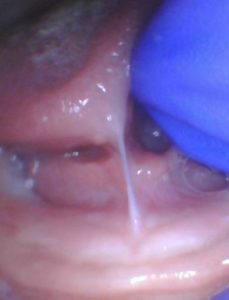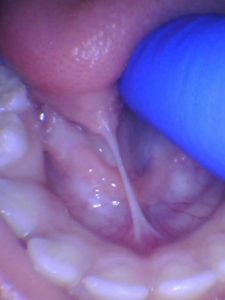How Do You Know if Your Baby Is Tounge Ties
It seems that everywhere you read online, a tongue-tie seems to be one of the offset issues suggested when babies can't consume or kids tin can't speak well. Let's go through some easy ways that parents can tell if their baby or kid might be affected by this status.
one. The Obvious

If your child has a center-shaped tongue, a short tongue, can't elevator or stick out their tongue, there might be a problem. Sticking the natural language out is non a great test. Instead, enquire your child to lift their natural language (or do it for them). If you can see an obvious string attaching near the top of the natural language, then at that place is very likely a restriction nowadays that could exist affecting your child. Go on to bespeak #3.

2. The Not-So-Obvious
Many times a parent volition call up their child has some or all of the symptoms of a natural language-tie, but when they elevator the tongue the string (frenum) isn't fastened to the tip or even most it. Information technology's l% of the manner back, or maybe even 25% visible or in that location might be no appearance of a frenum at all. A posterior natural language tie is a term that describes a less obvious variant of tongue brake that is more mutual than the archetype to-the-tip multifariousness simply is less easy to identify. Healthcare providers have non been taught near its existence in medical or dental schoolhouse, or in continuing education courses.
The posterior necktie is virtually easily identified by coming from behind the patient and lifting the natural language with both index fingers on either side of the tongue. The fascia or connective tissue bunches up and forms the appearance of a string or frenum, and oft there is a practiced flake of tension also. But the presence of this appearance solitary does non mean the infant or child has a tie. They must be having symptoms in addition to the tight string of tissue in club to qualify as a tongue-tie.

You gotta lift it up to see information technology!

Notice the restrictive lip-tie and not obvious (at first) tongue-tie, until tension is practical.
3. The Symptoms
Regardless of the advent under the natural language, it'southward the symptoms that count. No symptoms, no treatment. If it ain't broke, don't fix it! Common babe and child symptoms are listed below. Contrary to popular opinion, none of these symptoms are required or the absence of a symptom doesn't dominion out a tongue-necktie. Sometimes a tongue-tied infant has poor weight gain, other times they can be chunky and the female parent is compensating for the inefficient feeding, or has a large milk supply. Sometimes nursing hurts worse than labor, other times there is moderate pain, and sometimes there is zero hurting from a tongue-tied baby. (And very oftentimes, the painful latch happens in babies with a not-then-obvious posterior tongue-necktie.)
Some kids with a tongue-necktie take perfect speech, others accept a significant speech filibuster or speech issues with mumbling, clarity, sounds (R, L, Southward, etc.) and confidence. Same with feeding (slow and picky eating, especially with meat), and with sleep (restless sleep, snoring, teeth grinding, etc.). So it's the overall picture of the kid's limitations that are important. Look at all of the bug together, or check off a form like ours, the Infant Assessment Sheet or the Child Assessment Sail. If y'all accept more than a few checkmarks on there, there is probable a trouble.
Baby'south Issues
- Poor latch
- Poor weight gain
- Reflux or spitting up often
- Clicking or smacking noises
- Gassy or fussy oft
- Milk leaking out of the oral fissure
- Frustration with eating
- Prolonged nursing or feeding sessions
- Constantly hungry
Mother'due south Issues
- Painful nursing
- Creased, flattened, blanched nipples
- Blistered or cut nipples
- Poor breast Drainage
- Plugged ducts or mastitis
- Nipple shield required for nursing
Child's Issues
- Frustration with communication
- Trouble with speech communication sounds, hard to empathise, mumbling
- Speech delay
- Slow eater
- Picky eater, especially with textures (meat, mashed potatoes)
- Choking or gagging on liquids or foods
- Spitting out food or packing nutrient in cheeks
- Restless sleep (kicking or moving while asleep)
- Grinds teeth at dark
- Sleeps with rima oris open up
- Snores (quiet or loud)
- Frequent headaches or neck pain
four. Trust Your Mother'south Instinct
Sometimes you have to get with your gut. If you recollect something is "off" with your child, 99% of the time, something IS wrong. Even in the face up of professionals telling y'all "it's fine we come across this sometimes," or "all babies are fussy, gassy, colicky, etc.," or "his siblings talk for him," trust your instincts. Information technology'southward common for babies to be gassy and fussy, and not eat well, because frankly, tongue-ties ARE common (25% at our all-time electric current estimates). Because these symptoms are so common, they are confused for being normal.
Dental cavities are common, but non normal. If a babe is spitting up all the fourth dimension, "toots" like a grown human, and milk leaks out everywhere when eating, those are common symptoms, but not normal symptoms. There is very probable a physical reason to explain those. And very often, it's a lip or natural language-tie.
Then What Should You lot Do About Information technology?
It's helpful to see a lactation consultant or feeding therapist if you lot are concerned with your infant or child's feeding, merely make certain they have contemporary knowledge of natural language or lip ties. Ask if they have taken a form recently considering it'south not taught in schools all the same (even though it's been around since Biblical times).
Information technology's as well helpful to dominion out other issues, so see the speech therapist, or a myofunctional therapist, and initiate therapy. But if the tongue-necktie is obvious, no amount of therapy volition correct a structural trouble. If it is less obvious, then maybe therapy can help the issue, but if y'all striking a wall, or your child has symptoms in multiple domains (speech and feeding and sleep) and then have the tongue-tie treated every bit part of a comprehensive therapy plan, working aslope your therapist's recommendations.
That'due south why it'south so critical to find a therapist who has gone out of their way to gain knowledge (or here, or here, or here, lots of options for pedagogy!) in this emerging field of tongue and lip-ties, or tethered oral tissues (TOTs). At the same time, we have seen children who accept been in therapy for years, or even over a decade, that had a significant to-the-tip or close to the tip tongue-tie! The dentist, pediatrician, therapist, no one even mentioned it to the parent.
Make sure yous have your kid evaluated by a knowledgable provider, who has taken additional CE courses, attended recent conferences on tongue-ties, treats them routinely (several a week at to the lowest degree), and assesses for all the symptoms and possible presentations (anterior and posterior tongue-tie). It's a spectrum of brake, and some are obvious, other tongue restrictions are barely visible. Ensure they recommend stretches and exercises in improver to treatment, and enquire what method they use to release.
Educate yourself on the effects a tongue brake can take on an baby, child, or adult, and spread the word. We have some additional information on our webpage, The Facts.
We're trying to spread the discussion with our recent book, Tongue-Tied: How a Tiny Cord Under the Natural language Impacts Nursing, Speech, Feeding, and More than (download PDF sample hither) too as our latest article published in Clinical Pediatrics on the functional improvements after a proper tongue-tie release.
In our study (download the PDF here!), 89% of the children had improved speech later the procedure, 83% had better feeding, and 83% had better slumber. So it'due south not every child has improvements in every area, just many do. When combined with therapy, those numbers are even better.

If y'all are a parent and concerned your kid might have a tongue-tie, we'd be happy to conversation with you or schedule a consultation. But call the states at 205-419-4333 or transport u.s. a bulletin.
If y'all are a provider and have whatever questions about this post, or want to learn more, cheque out our recent course, Natural language-Tied Academy designed to assistance providers learn the procedure and Tongue-Tied University LITE for therapists who want to acquire more. In that location is even a free preview of the course available. Y'all can use the coupon code BLOG to save $250 off the full version or save $l off the LITE version.
Source: https://tonguetieal.com/4-ways-to-tell-if-your-child-has-a-tongue-tie-and-what-to-do-about-it/
0 Response to "How Do You Know if Your Baby Is Tounge Ties"
Post a Comment